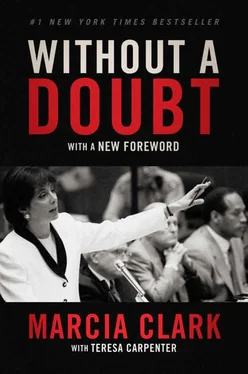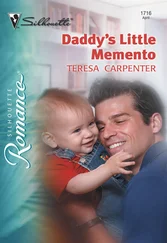First order of business: reel in Kato Kaelin. O. J. Simpson was clearly Kato’s benefactor. I could just about bet that had Kato known Simpson was a suspect, he would not have spoken so freely about the thump, for instance, and risk dumping his meal ticket. On the other hand, however, I’d had a chance to study his witness statement pretty thoroughly by now. I felt he had to know a lot more about the Simpsons’ private lives than he’d told the cops.
Early Friday morning I dispatched a couple of detectives to West L.A. to serve Kato with a subpoena. David and I were in conference with Gil when I got a call from one of the cops on the detail.
“Kaelin’s here with us,” he said. “But he says he won’t talk unless his lawyer’s with him.”
“Bring him in anyway,” I told him.
This was extremely unusual. Witnesses don’t arrive in the company of lawyers unless they’re worried about being charged with a crime. From what I could see, Brian Kaelin had no criminal liability. The events he’d witnessed on the night of June 12 had clearly occurred after the murders. I was afraid that his request for an attorney meant that Simpson had gotten to him.
The cops brought Kato into my office at a little past nine. I looked up from my paperwork and saw for the first time that wild mane of dirty-blond hair, casual hip clothes, goofy surfer-boy slouch. My first thought: Zone-out case .
“Hey, guy,” I greeted him. Casual seemed the way to go.
He shook my hand and fidgeted like a puppy.
“Have a seat while I call my boss.”
“Hi, sure, no problem.”
He plopped down in one of the chairs across the desk from me. David said he’d be delayed a few minutes, to start without him.
I began by asking Kato how much sleep he’d gotten that night. Did he feel prepared to go before a grand jury? He answered in half sentences, nodding a lot, managing to say very little. Great , I thought, this guy can barely handle small talk - what’s going to happen when we put him on the stand?
I cut to the chase: “Do you remember what you were doing when you heard the thump on your wall?”
“I think I was talking to my friend Rachel. Yeah, I was talking to Rachel.”
Okay; that was what he had told the cops.
“Did you tell her about what you’d heard?”
“I really don’t… um… you know… want to say anything until my attorney gets here. I mean, you seem real nice and all, and… um… I really want to help you out. But… um… I really can’t talk about the case without him. I’m real sorry, really, Marcia. I am.”
His words tumbled over each other as he squirmed in his seat and cast me a beseeching look.
I wasn’t buying this act. Kato wasn’t as dumb as he appeared. He’d cut off the questioning expertly.
“Kato, I don’t get it,” I told him. “Why do you think you need a lawyer? As far as I can tell, you have no liability whatsoever. If there’s more to it, please say so now and I won’t say another word until your lawyer arrives.”
“No, no. It’s not that. It’s just that my lawyer told me I shouldn’t say anything unless he’s here.”
When David finally showed up, he, too, lobbed Kato a few low and slow ones. No dice. Then, Kato’s lawyer, a young guy named William Genego, finally arrived and demanded that we stop talking to his client until he could read the witness report. David offered them his office as a conference room. It was only about 9:30; Kato didn’t need to get on the witness stand until early afternoon. But Genego said that wasn’t good enough. He’d need the whole weekend to go over the statement.
That was ridiculous. The statement was only two pages long. David laid it on the line.
“Your client was subpoenaed to appear before the grand jury at one-thirty this afternoon. Make sure he’s there.”
The tussle with Kato was small-time compared to the trouble brewing beyond the walls of the Criminal Courts Building. I was oblivious to the rumblings until about noon, when I was paged by the office’s indomitable senior legal assistant, Patti Jo Fairbanks. Patti Jo had the authoritative air of a four-star general and the voice of a drill sergeant.
“Marcia!” she bellowed. “I need to see you in my office, right now!”
Sounded serious. I walked the few short steps between her office and mine, poked my head in, and asked, “What’s the deal?”
“Come in and close the door.”
Good news never comes when they tell you to close the door.
“It’s Simpson,” she said. “He was supposed to turn himself in at Parker Center this morning and he didn’t show.”
What?
Shapiro, Patti Jo told me, was to have brought Simpson in to Parker Center by eleven o’clock. An hour later, still no sign of him.
“The cops are plenty pissed,” she told me. “They’re going to send a unit out there to get him.”
“I thought they didn’t know where he was.”
“He’s staying over at Kardashian’s place in the Valley,” Patti Jo replied. She was referring to Robert Kardashian. Up till then, I’d never heard of the guy, but he was apparently a longtime buddy of O. J. Simpson.
Curiouser and curioser. How did so much manage to happen without our knowledge? I’d never seen this before-and it was certainly a bad sign.
The phone rang. Robert Shapiro.
“Let me talk to him,” I mouthed to Patti Jo.
“Just a minute,” she told him. “Marcia’s sitting right here.”
She handed me the phone.
I dispensed with pleasantries.
“What’s going on, Bob?” I said. “This is no time to screw around.”
“Marcia, I promise you. He’s coming in. We just need to do a few things,” said Shapiro.
“What do you mean?” I shot back. “He’s had all week to get his things together. What are you guys doing?”
“He’s being checked out by some doctors,” said Shapiro. His speech was infuriatingly slow, his tone condescending. “I’m sure you’ve heard that he’s very depressed. We Just need to be sure that he doesn’t go into custody in a suicidal frame of mind.”
“Oh, I’m sure he’s depressed.” I snorted. “He’s got very good reason to be depressed. I just want to hear back from you in half an hour telling me he’s left.”
Over the next few minutes, there was a flurry of calls between us. Shapiro kept insisting that “It’s going to be a little longer than we thought.” Simpson would need another hour, he insisted. Then, inexplicably, he passed the receiver to someone else.
“Who’s this? ” I asked the stranger.
“Saul Faerstein.”
I knew that name. Faerstein was a forensic psychiatrist who testified in criminal courts around L.A. County. The line on him was good. What the hell was he doing at Kardashian’s? Were they laying the groundwork for some kind of diminished-capacity defense? I asked Faerstein for directions to the house and he gave me some convoluted reply. When I tried to clarify them, he became even more evasive. Finally, I lost my patience.
“Doctor, you’d better stop playing games here,” I said. “Do you understand that you’re obstructing justice? That’s a criminal charge, and I don’t think you need a record like that, do you?”
He must have tossed the phone like a hot potato; in an instant Shapiro was back on the line. I was in the process of extracting directions from him when Patti Jo signaled me to break away. She had the LAPD’s Valley Division chief on the line. They’d finally gotten their own fix on the safe house and were on their way.
Show time. I took a deep breath and pushed through the doors to the grand jury room. I flashed my best warm-up smile to the jurors seated in the little three-tiered amphitheater. I tried not to betray my anxiety as I first welcomed them and then had to explain our departure from ordinary procedure. I would be deferring my opening statement until Monday.
Читать дальше












